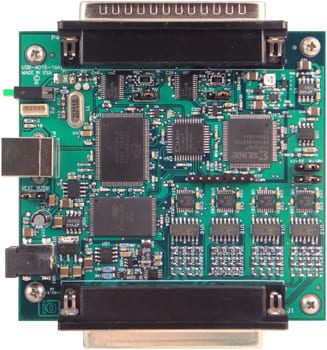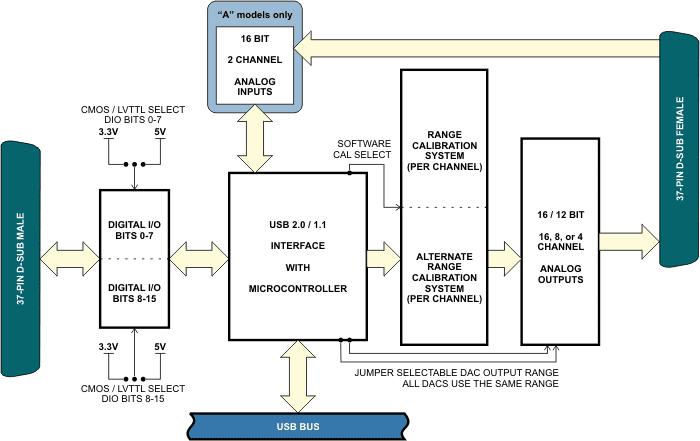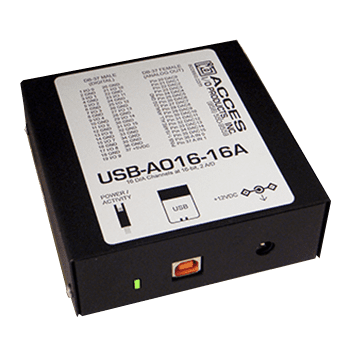USB-AO16-16A Analog Output Module
Features
- 4, 8, or 16 analog outputs with 12 or 16-bit resolution
- High-speed USB 2.0 device, USB 3.0 and 1.1 compatible
- Unipolar and bipolar output ranges of 0-10V, ±5V (contact factory for additional ranges)
- Real-time hardware calibration per channel
- Update outputs individually or simultaneously at speeds up to 4kHz
- Two 16-bit analog inputs and 16 lines of digital I/O
- All digital I/O lines buffered with 10mA source, 24mA sink current capabilities
- Resettable 0.5A fused +5V available to the user
- Includes external AC to 12V @ 1Amp DC regulated adapter
- Connections made via industry-standard 37-pin D-Sub connectors
- USB/104 form-factor for OEM embedded applications
- Standard (enclosed) version includes external 12V power supply (USB-PWR-12V)
- OEM version (board only) features PC/104 module size and mounting compatibility
- Alternate micro-fit embedded USB header connector
- Custom high-speed function driver (non-HID)
- Type B USB connector features industrial strength and high-retention design
- Small, (4″ x 4″ x 1.25″) rugged, industrial enclosure
- Labview VI driver
-
- Now with Firmware 2.0 features!
- Onboard Watchdog Timer, configurable power-on defaults, digital input debouncing and latching, digital output Pulse Width Modulation (PWM) and Matrix Mapping
- Designed, made, supported, and manufactured in the USA
FACTORY OPTIONS
- Extended operating temperature (-40° to +85°C)
- Analog output ranges (±10V, 0-5V, or nearly anything you specify!)
- OEM (board only) version with PC/104 mounting holes and PCB footprint for added flexibility in embedded applications
- Screw terminals for 12V input power connection
- RoHS Available. Please contact us for ordering information
- Support for Wind River VxWorks (call for ordering information)
$329.00 – $769.00
In StockDescription
Multifunction USB modules provide 4, 8, or 16 Analog Outputs and 2 Analog Inputs
The USB-AO Series provides 4, 8, or 16 single-ended analog outputs (digital-to-analog converters, i.e. DACs) with either 12- or 16-bit resolution. Additional features include two 16-bit analog inputs (analog-to-digital converters, i.e. ADCs) and 16 digital I/O lines—all packaged in a small, rugged, industrial enclosure. This module can be used in any PC or embedded system with a USB port and is an ideal choice for embedded system and test designers. The unit can be used in an assortment of USB-based embedded applications which require stable and accurate output signals. Ideal applications include light control, motion control, and process controls.
The boards feature jumper selectable unipolar and bipolar output ranges of ±5V or 0-10V ranges for the DACs. Additional ranges can be achieved as factory options giving the user a variety to select from. All analog output channels can be updated either individually or simultaneously at up to 4kHz. System calibration specific to user requirements can be performed via a provided, easy-to-use, software utility. Automatic circuits limit analog outputs to zero volts until initialized via software command.
16 digital I/O lines are provided in two groups of 8 bits. Both digital bytes are individually software configured as input or output. Each 8-bit digital I/O group also can be configured for either 5V CMOS or 3.3V LVTTL signaling via jumper selection.
The USB-AO Series is designed to be used in rugged industrial environments but is small enough to fit nicely onto any desk or testing station. The board itself is PC/104 sized (3.550 x 3.775 inches, 90mm x 96mm) and ships inside a steel powder-coated enclosure with an anti-skid bottom. A DIN rail mounting provision and extended temperature is available for installation in industrial environments.
All connections are made via industry-standard 37-pin D-Sub connectors.
The USB-AO Series includes 10 models with different output and input quantities, and resolutions.
Firmware 2.0 Features
Onboard Watchdog Timer. If your application fails to communicate with the device within a specified timeout period (up to hundreds of seconds) the onboard intelligence will change all the output ports and values to the configured “safe” state.
Need a DAC to power up at 1 Volt? Want the digital output port to generate a square wave as soon as the firmware is loaded? Now you can configure the power-on default states for all possible outputs.
Command the onboard intelligence to perform digital input debouncing and latching. Debouncing time constants from hundreds of microseconds to hundreds of milliseconds allows a wide variety of low-pass filtering options. Latching inputs record low- and high-going pulses that your application may otherwise have missed.
PWM allows programmable duty-cycle square wave output on any digital output. MAP is our new Matrix Mapping feature, wherein you can command the onboard intelligence to automagically copy the state of one bit onto another bit, with no computer interaction required.
OEM USB/104 FORM FACTOR
The OEM (board only) version is perfect for a variety of embedded applications. What makes the OEM option unique is that its PCB size and pre-drilled mounting holes match the PC/104 form factor (without the bus connections). This ensures easy installation using standard standoffs inside most embedded enclosures or systems. The board can be added to any PC/104-based stack by simply connecting it to a USB port included on-board with embedded CPU form factors such as EBX, EPIC, and PC/104. This is especially important since many newer CPU chipsets do not support ISA and have plenty of USB ports. Future stacks will be using the extremely fast PCI Express bus which is essentially overkill for simple monitoring and control. For embedded OEM type applications, an additional micro-fit USB input header is provided.

High Retention USB Connector
The ever-growing presence of USB in the industrial/military marketplace has driven the need for USB connections to be reliable, dependable, and unfailing. Gone are the days of loose USB connections. A type B USB connector is used on all ACCES USB/104 products which features a high retention design that complies with the class 1, Div II minimum withdrawal requirement of over 3 pounds of force (15 Newtons). This connector has an orange color-coded insulator to quickly differentiate it from standard USB connectors. Using these USB connectors increases reliability in your system and ensures a tight connection. For embedded OEM type applications, an additional micro-fit USB input header is provided.
Applications
- Process Control
- Light Control
- Motion Control
- Mobile Solutions
- Test Equipment
- Kiosks
- Robotics
- Machine Control
- Laboratory Monitoring and Control
- Security Systems
- Industrial Automation
- Embedded OEM
Optional Accessories
Available accessories include a wide variety of cables and screw terminal boards for quick and easy connectivity. Also, a DIN rail mounting provision is available.
Need more isolation?
Isolate your I/O with our USB-ISOLATOR accessory! Tru-Iso™ signal isolation up to 4kV meets EN60601 standards in a rugged industrial-grade, extended temp (-40 to +85°C) package — no connection to power needed! Use with our 1-foot USB cable and avoid tangles. OEM-version available, featuring picoblade microfit headers for hassle-free embedded cabling.
Downloads
Data Sheets
Manuals
Software
- USB-AO16-16A Software Package ( -- Last Uploaded 2025-05-07)
- Linux Software Packages
- LabVIEW Software Packages
Drivers and Downloads
Full list of available Downloads: Software Packages, Drivers, Manuals, and other documents
Information about our Free Software packages:
ACCES is proud to provide a full suite of software support with every Data Acquisition product. We are committed to supporting the most popular operating systems and platforms for our customers. Currently we are actively supporting 7 -> 11, both 32 & 64 bit, including “Server 2008,” “Embedded,” and “Compact” flavors for all plug-and-play products including PCI, PCI Express, USB, and more. Many products continue to ship with support for additional operating systems such as DOS, Windows 95, 98, Me, NT4, 2000, and XP.
Samples
Among the software we deliver with our products are sample programs in a wide variety of programming languages. These samples are used to demonstrate the software interfaces to our products — and many can be used as-is in your production environments, or to test functionality of the devices out-of-the-box. We’re currently actively supporting sample programs in Microsoft Visual C#, and Delphi, with many devices including samples in Visual Basic (5 and .NET), Visual C/C++, and Borland C/C++ 3.1 for DOS. Additionally we provide National Instruments LabVIEW compatible DLLs and many demonstration VIs for our devices.
Drivers
Drivers for various operating systems are also provided, including active support for Windows 7 -> 11 — all in both 32-bit and 64-bit flavors, and including consumer, server, and embedded varieties — as well as the 2.6 and newer Linux kernels and recent OSX / macOS versions. Many products continue to ship with driver support for Windows 95, 98, Me, NT4, Windows 2000, XP, and more, but support for these operating systems is considered deprecated.
Setup Programs and Utilities
Our Data Acquisition devices also include a graphical setup utility that walks you through the process of configuring any option jumpers or switches on the device, as well as explaining a little about the various connectors present.
Many devices also include utility programs – little tools to make your use of the device easier, such as EWriter, a program that allows you to read and write data in the user-accessible EEPROM locations on all our USB data acquisition products; or WinRISC, a “Really Incredibly Simple Communications” terminal program that lets you get started instantly with serial devices.
“Register Level” Documentation
Besides all this software in all these languages and operating systems ACCES has a policy of open and transparent development: none of our lowest-level “register” interfaces are hidden from you — we document every register in every bus card, every command in every serial board, and every usb control transfer in every USB Data Acquisition board. These lowest-level interfaces allow you to develop for our products in ANY operating system or language, regardless of our actively supporting it or having a driver for it. We have customers actively developing in ADA, Android, Python, Java, MATLAB, Solaris, and more, just by referring to our complete low-level interface documentation! And we provide the full source code to all of our drivers, regardless of operating system, to give you an even bigger head start in your own development tasks.
No Fees or Royalties
All of this software is provided at no additional charge, and is licensed under any of a variety of flexible — and royalty free — options. Check out our software license explanation if you’d like more information.
USB and Performance
Our USB Data Acquisition products use our “AIOUSB” driver package in Windows and Linux. This driver package includes 32-bit and 64-bit support, and consists of low-level driver components and a high-level API library. This custom interface driver enables our USB devices to achieve 4000 transactions per second, compared to the competitions’ “HID” drivers that cap out around 50 transactions per second. You can read all about the API in the USB Software Reference Manual linked below, and included in every applicable Software Package. (The Linux version of the AIOUSB API is almost identical to the Windows API, and is documented in the aiousb.html file included in the Linux software package.) Like all of our software, full source code is always provided.
Custom Software
ACCES also offers Custom Software Services for our products. Our prices are unbelievably low, often as inexpensive as free! If you need something tweaked to support your needs, or an entire enterprise application developed from scratch, it is definitely worth your time to inquire with us, first.
Further information about available ACCES Software:
Redistributing Windows Drivers
A list of ACCES drivers and the files that compose them under different versions of Windows, so you can easily redistribute ACCES cards and drivers.
aioUSB.VxWorks
ACCES has successfully partnered with Wind River to bring our entire line of USB DAQ boards to VxWorks 7!
Our newly available driver and easy-to-use API-library, including full source and sample code, supports ReNumeration for loading firmware across the USB cable as well as our GenericVendorWrite and GenericVendorRead functions, compatible with our Windows AIOUSB.dll API. Additional AIOUSB API functions are being ported, ask for details!
With our aioUSB.VxWorks libary USB DAQ can now be used with the utmost confidence for real-world/real-time/rugged applications. Using VxWorks 7 as the solid foundation, and positive-retention cables in either micro-fit or USB-B-with-screw, as well as rugged steel enclosures and DIN-Rail or PC/104-mounting options, USB is no longer “just for desktops”.
You can find more information about our VxWorks libraries and services on our Wind River Silver Partner page.

Analog Outputs
- Number of Outputs: 16 channels
- Type of Outputs: Single-ended
- Resolution: 16-bit resolution (12-bit available)
- Unipolar Ranges: 0-10V standard, 0-5V*
- Bipolar Ranges: ±5V standard, ±10V*
- Conversion Rate: 4kHz, all channels simultaneous
- Relative Accuracy: ±4 LSB typical
- Diff. Non-linearity: ±0.25 LSB typical
- Settling Time: 8us typical, 10us max
- Output Current: ±12 mA per channel
* Factory Configured
Digital Inputs
- 3.3V configuration
- Logic High: 2VDC min, 5.5VDC max
- Logic Low: 0.8VDC max, -0.5VDC min
- 5V configuration
- Logic High: 3.5VDC min, 5.5VDC max
- Logic Low: 1.5VDC max, -0.5VDC min
Digital Outputs
- 3.3V configuration
- Logic High: 2.4VDC min, source 10 mA
- Logic Low: 0.55VDC max, sink 24 mA
- 5V configuration
- Logic High: 3.8VDC min, source 10 mA
- Logic Low: 0.55VDC max, sink 24 mA
Analog Inputs
- Number of channels: 2
- ADC Type: Successive Approximation
- Sampling Rate: 4k samples per second
- Resolution: 16-bit
- Unipolar range: 0-5V
Environmental
- Operating Temp.: 0° to 70°C
- Storage Temp.: -40° to +85°C
- Humidity: 5% to 95% non-condensing
- Board Dimension: 3.550 x 3.775 inches
Power
- +12VDC: @ 100 mA typical, no-load on DIO buffer sourced outputs and DAC outputs @ 520 mA typical, full-load on DIO buffer sourced outputs and DAC outputs
- Includes external AC to 12V @ 1Amp DC regulated adapter (not included with -OEM option)
- Optional screw terminal power input
| Model | Description | Price (USD) | |
|---|---|---|---|
| USB-AO16-16A | USB 16 Bit, 16 Channel Analog Output Module w/ 2 Analog Inputs | $769.00 | |
| USB-AO16-16E | USB 16 Bit, 16 Channel Analog Output Module | $604.00 | |
| USB-AO16-8A | USB 16 Bit, 8 Channel Analog Output Module w/ 2 Analog Inputs | $604.00 | |
| USB-AO16-8E | USB 16 Bit, 8 Channel Analog Output Module | $439.00 | |
| USB-AO16-4A | USB 16 Bit, 4 Channel Analog Output Module w/ 2 Analog Inputs | $484.00 | |
| USB-AO16-4E | USB 16 Bit, 4 Channel Analog Output Module | $329.00 | |
| USB-AO12-16A | USB 12 Bit, 16 Channel Analog Output Module w/ 2 Analog Inputs | $734.00 | |
| USB-AO12-16E | USB 12 Bit, 16 Channel Analog Output Module | $569.00 | |
| USB-AO12-8A | USB 12 Bit, 8 Channel Analog Output Module w/ 2 Analog Inputs | $569.00 | |
| USB-AO12-8E | USB 12 Bit, 8 Channel Analog Output Module | $404.00 |
| Accessories | |
|---|---|
| Direct Connect Terminals | |
| ADAP37M-MINI | Screw terminal adaptor for use with 37-pin female connector for Analog signals $40 |
| ADAP37F-MINI | Screw terminal adaptor for use with 37-pin male connector for Digital signals $40 |
| Terminal Board Mounted to Product | |
| STB-74 Kit | Mounts the STB-74 to the USB-AO Series. Includes STB-74, cables and specialized mounting hardware. $115.00 |
| Cable Connectivity | |
| CAB37MF-36 | Ribbon cable, male to female 37-pin connectors, 36″ for Analog signals $32 |
| CAB37MF-18 | Ribbon cable, male to female 37-pin connectors, 18″ for Analog signals $29 |
| CAB37-18 | Ribbon cable, female to female 37-pin connectors, 18″ for Digital signals $25 |
| CAB37-36 | Ribbon cable, female to female 37-pin connectors, 36″ for Digital signals $29 |
| STB-37 | DIN-rail mountable screw terminal board with Male 37-pin connector $39 |
| Mounting Hardware | |
| MP104-DIN | USB/104 DIN Rail Mount |
| DIN-SNAP | One foot length SNAP-TRACK with four clips for mounting up to two STB-37 screw terminal boards $20 |
| External Power and Hub | |
| USB-PWR-12V | External power supply, AC to 12V @ 1Amp DC regulated adapter $29 (included with standard, enclosed version) |
| PWR-ADAP-1 | International Power Plug Adapter: Type I – AU/NZ/China |
| PWR-ADAP-2 | International Power Plug Adapter: Type G – UK/Hong Kong |
| PWR-ADAP-3 | International Power Plug Adapter: Type C – Europe, India, Israel |
| USB-104-HUB | Rugged, industrial grade, 4-port high-speed USB 2.0 hub |
| Model Options (call for pricing) | |
| -OEM | Board only version (no enclosure or power supply) |
| -T | Extended temperature operation (-40° to +85°C) |
| -10B | Unit with ±10V range only |
| -5U | Unit with 0-5V range only |
| Call | Unit with YOUR range only |
| -ST | Screw Terminals for 12V power input (replacing DC jack) |

